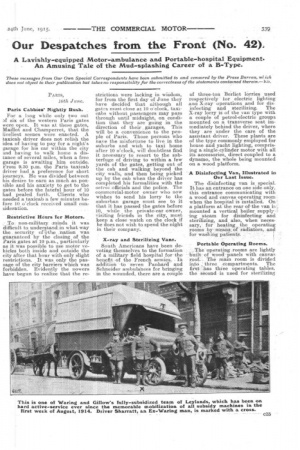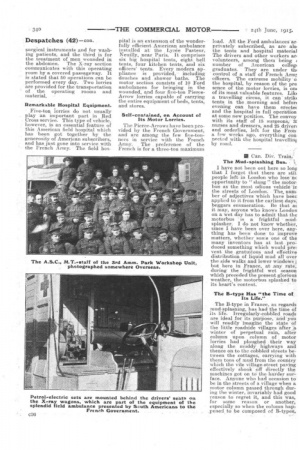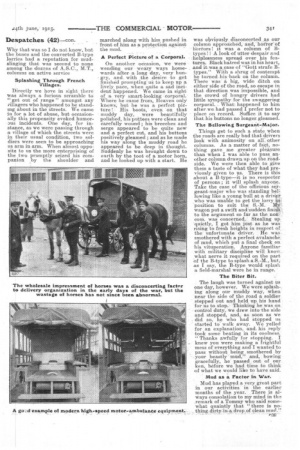Our Despatches from the Front (No. 42),
Page 13

Page 14

Page 15

If you've noticed an error in this article please click here to report it so we can fix it.
A Lavishly-equipped Motor-ambulance and Portable-hospital Equipment. An Amusing Tale of the Mud-splashing Career of a B-Type.
These messages from Our Own Special correspondents have been submitted to and censored by the Press Bureau, wlich does not object to their publication but takes no responsibility for the correctness of the statements contained therein.—E.D.
PARIS,
16th June.
Paris Cabbies Nightly Rush.
For a long while only two out if six of the western Paris gates were open. It was at these gates, Maillot and Champerret, that the liveliest scenes were enacted. A taxicab driver does not relish the idea of having to pay for a night's garage for his car within the city oid having to walk home a distance of several miles, when a free garage is awaiting him outside. Prom 9.30 p.m. the Paris taxicab driver had a preference for short journeys. He was divided between his desire to earn as inueh as pos.sible and his anxiety to get to the gates before the fateful hour of 10 had pealed forth. Clients who needed a taxicab a few minutes before 10 o'clock received small confidera tion.
Restrictive Hours far Motors.
.To non-military minds it was difficult to under,E,Itand.in what way the. security of r.tthe _nation was gila.ranteed by the closing of the Paris gates at 10 p.m., particularly as it was possible to use motor vehicles both inside and outside the city after that hour with only slight restrictions. It was only the passage of the city barriers which was forbidden. Evidently the Dowers have begun to realize that the re strictions were lacking in wiidorn, for from the first day of June they have decided that although all gat::s must dose at 10 o'clock, taxicabs without passengers may pass through until midnight, on condition that they are going in the direction of their, garages. This will be a convenience to the people of Paris. Those persons who nave the misfortune to live in the suburbs and wish to taxi home after 10 o'clock, will doubtless find it necessary to resort to the subterfuge of driving to within a few yards of the gates, getting out of the cab and walking beyond the city walls, and then being picked up by the cab when the driver has completed his formalities with the oetroi officials and the police. The commercial-motor owner who now wishes to send his lorry to the suburban garage must see to it that it has passed the gates before 10, while the private-ear owner, visiting friends in the city, must keep a close watch -on the clock if he does not wish to spend the night
in their company. .
X-ray and Sterilizing Vans.
South Americans have been devoting themselves to the formation of a militaryfield hospital for-the benefit. of the French armies, In addition 'AO seven Panhard' and Schneider ambulances for bringing in the wounded, there are a couple
of three-ton Berliet lorries used respectively tor electric lighting and X-ray operations and for disinfecting and sterilizing. The X-ray lorry is of the van type with a couple of petrol-electric groups mounted on a transverse seat immediately behind the driver, where they are under the care of the assistant driver. These plants are of the type commonly employed for house and yacht lighting, comprising a single-cylinder motor with all its accessories, direct coupled to a dynamo, the whole being mounted on a wood platform.
A Disinfecting Van, Illustrated in Our Last Issue.
The disinfecting van is special. It has an entrance on one side only, this entrance communicating with a wood and canvas operating room when the hospital-is installed. On a platform at the rear of van is mounted a vertical boiler supply--f -ingsteam for disinfecting and sterilizing, and also, when necessary, for heating the operating rOonis by. means, or radiators, and for washing patients.
Portable Operating Rooms.
The operating rooms are lightly built of wood panels with canvas roof. The main room is divided into three compartments. The first has three operating tables, the second is used for sterilizing surgical instruments and for washing patients, and the third is for the treatment of men wounded in the abdomen. The X-ray section coMmunicates with this operating room by a covered passageway. It is stated that 50 operations can be performed every day. Two lorries are provided for the transportation of the operating rooms and material.
Remarkable Hospital Equipment.
Five-ton lorries do not usually play an important part in Red Cross service. This type of vehicle, however, is an essential feature of this American field hospital which has been got together by the generosity of American subscribers, and has just gone into service with the French Army. The field hos
pital is an extension of the wonderfully efficient American ambulance installed at the Lyeee Pasteur, Neuilly, near Paris. It comprises six big hospital tents, eight bell tents, four kitchen tents, and six officers' tents. Every modern appliance is provided, including douches and shower baths. The motor section consists of 10 Ford ambulances for bringing in the wounded, and four five-ton Pierce. Arrow lorries capable of carrying the entire equipment of beds, tents, and stores.
Self-contained, on Account of Its Motor Lorries.
The Pierce-Arrows have been provided by the French Government, and are among the few five-tonners in service with the French Army. . The . preference of the French is for a three-ton maximum
load. All the Ford ambulanceS an privately subscribed, as are alse the tents and hospital material The drivers and other workers art volunteers, among them being e number of American college graduates. They are under the control of a staff of French Arne. -officers. The extreme mobility " o the hospital, by reason of the pre sence of the motor •lorries, is one of its most valuable features. Like a travelling circus, it can strike tents in the _morning and before evening can have them erectec and the hospital in full operation at some new position. The convoy with its staff of 15 surgeons, 2f nurses and dressers, and 25.drivere and orderlies, left for the Fran: a few weeks ago, everything don neeted with the hospital travellink by road.
al Can. Div. Train:' The Mud-splashing Bus.
I have not been out here so long that I forget that there are stil, people left in Londonwho iose'nc opportunity to " slang 7! the Motorbus as the most odious vehicle -in the streets of London: The, nitinber of adjectives which have been applied to it from the earliest days; beggars enunieration. Be that oE it may, anyone who knoWs London on a wet day has to admit that the motorbus .• is a frightful • unidsplasher. I do not know whether, • since I have been over here, a,iay. thing has been' done to improve matters, whether some one of the many inventors has at last produced something which would prevent the . gratuitous and effective distribution of liquid mud all over -the side walks and lower windows; but here in France, at any rate; during' the frightful wet season which preceded the present gioriotti weather, the motorbus splashed to its heart's 'content.'
The B-type Has "the Time of Its Life."
The B-type in France, as regards mud-splashing, has had the time of its life. Irregularly-cobbled roads are ideal for its purpose, and you will readily imagine the state • of the little roadside villages after a winter of perpetual rain, after column upon column of motor lorries had ploughed their way along the muddy highways and thence on to the cobbled streets between the cottages, carrying with them tons of mud from the country which the vile village-street paving effectively shook off directly the machines got on to the harder surface. Anyone who had occasion -to be in the streets of a village when a motor column passed through during the winter, invariably had good reason to regret it, and this was, for some reason or another, especially so when the column hap-. pened. to be composed of B-types. Why that was so I do not know, but the buses and the converted B-type lorries had a reputation for mudslinging that was second to none among the dozens of A.S.C., columns on active service
Splashing Through French Villages,
Directly we hove in sight there was always a furious scramble to "get out of range" amongst any sillagers who happened to he standing about in the streets. We came in for a lot of abuse, but occasionally this propensity evoked humorous incidents. One day, for instance, as we were passing through a village of which the streets were in their usual condition, two soldiers were seen to be approaching us arm in arm. When almost opposite to us the more enterprising of the two promptly seized his companion by the shoulder and marched along with him pushed in .froist of him as a protection against the mud.
A Perfect Picture of a Corporal.
On another occasion, we were wending our weary ways homewards after a long day, very hon. gry, and. with the desire to get finished prompting tiS to keep up a lively pace, when quite a sad incident happened. We came in sight of a very smart-looking corporal. Where he came from, Heaven only knows, but he was a perfect picture ! His boots, even on that muddy day, were beautifully polished, his puttees were clean and carefully wound ; his breeches and serge appeared to be quite new and a perfect cut, and his buttons positively gleamed ; and as he made his way along the muddy road he appeared to be deep in thought. Suddenly he was brought down to earth by the toot of a motor horn, and he looked up with a start. He
was obviously disconcerted as our column approached, and, horror' Of horrors! it was a column of Btypes ! A look of utter despair and -helplessness spread over his features. Black hatred was in his heart, and it was asase of "Gott strafe Btypes." With a shrug of contempt he turned.his -back on the column. There was a big, wide ditch on either side of the road, so escape in that direction was impossible, and the crowd of hungry drivers had little synipathy for the swaggering corporal.. What happened to him after we had passed I prefer not to place an record. Suffice it to say that his buttons no longer. gleamed.
The Bellowing Sergeant-Major.
Things get to such a state' when the roads are really bad that drivers look with animosity on all other columns. As a matter of fact, nothing gave me greater pleasure than when I was able to pass another column drawn up on the shadside. We were then able to give them a taste of what they had previously given to us. There is tMs about a B-type—it is no respecter of persons ; it will splash anyone. Take the case of the officious sex.geant-major who was standing loel:: lowing like a young bull at a drill,* who was unable to get the lorry position to suit the S.-M.
wagon put a swift and sudden fini to the argument so far as the non: corn. was concerned. Stealing up, quietly, I got him just as he was rising to fresh heights in respect of the unfortunate driver. Ile was smothered with a perfect avalanche, of mud, which put a final check on his vituperation. Anyone familiar with military discipline will knoVs what nerve it required on the part of the B-type to splash a S.-M., but, as I say, the B-type would splash a field-marshal were he in range.
The Biter Bit.
The laugh was turned against us one day, however. We were splashing along our muddy way, when near the side of the road a soldier stepped out and held up. his hand for us to stop.Thinking he was oncontrol duty, we drew into -the side and stopped, and, as soon as we did so, he who had stopped us started to walk away. We yelled for an explanation, and his reply took some beating in its coolness. "Thanks awfully for stopping. I knew you were making a frightful mess of everything and I wanted to pass without being smothered by your beastly mud," and, bowing gracefully, he passed out of our ken, before we had time to think of what we would like to have said.
Mud as a Factor in War.
Mud has played a very great part in our activities in the earlier months of the year. There is always consolation to my mind in the remark of a Tommy who said somewhat quaintly that "there is no




























